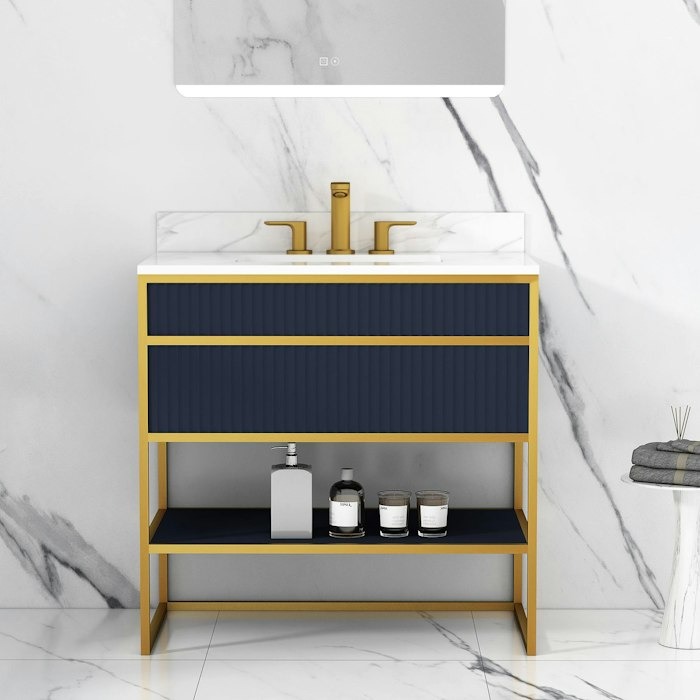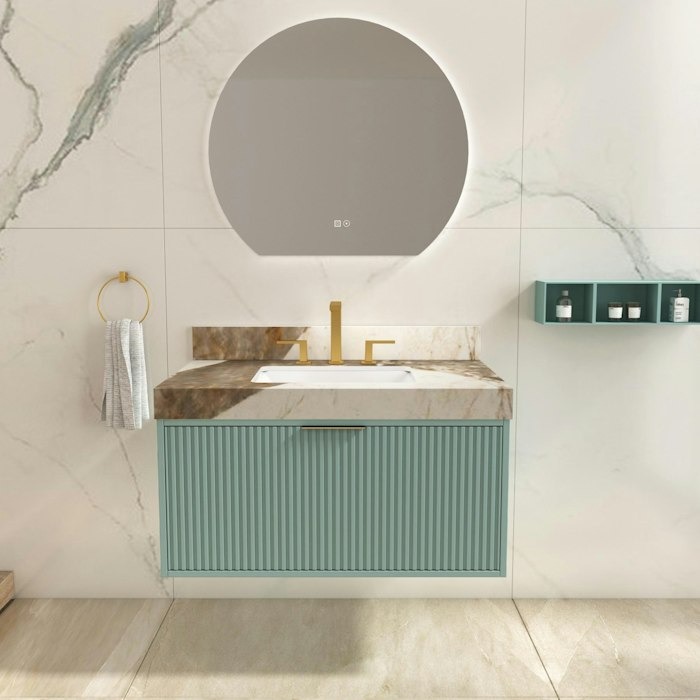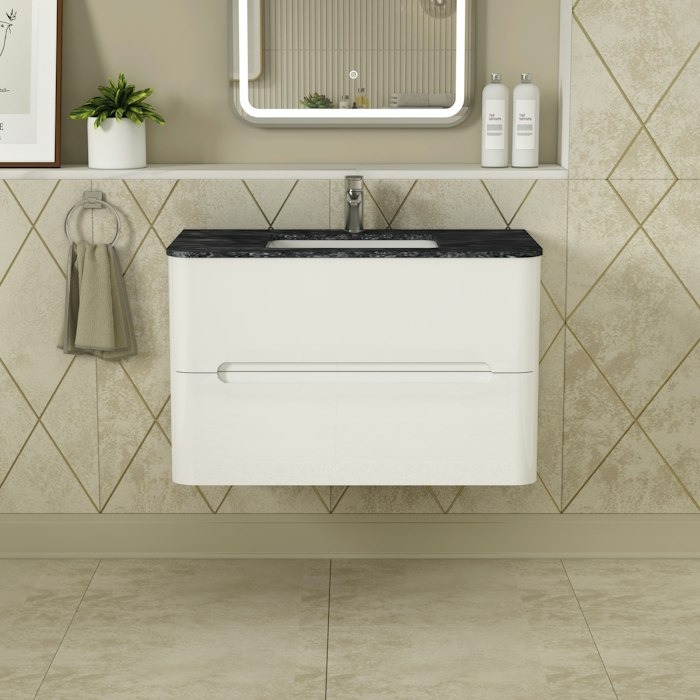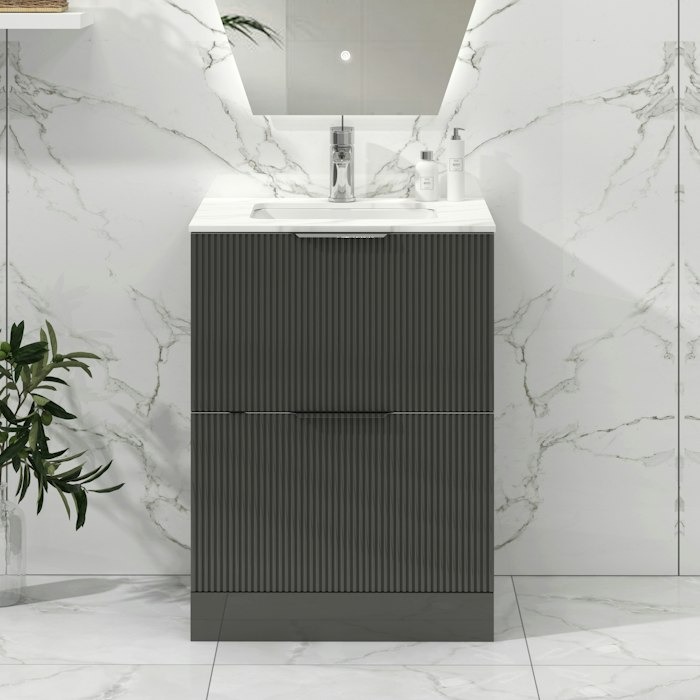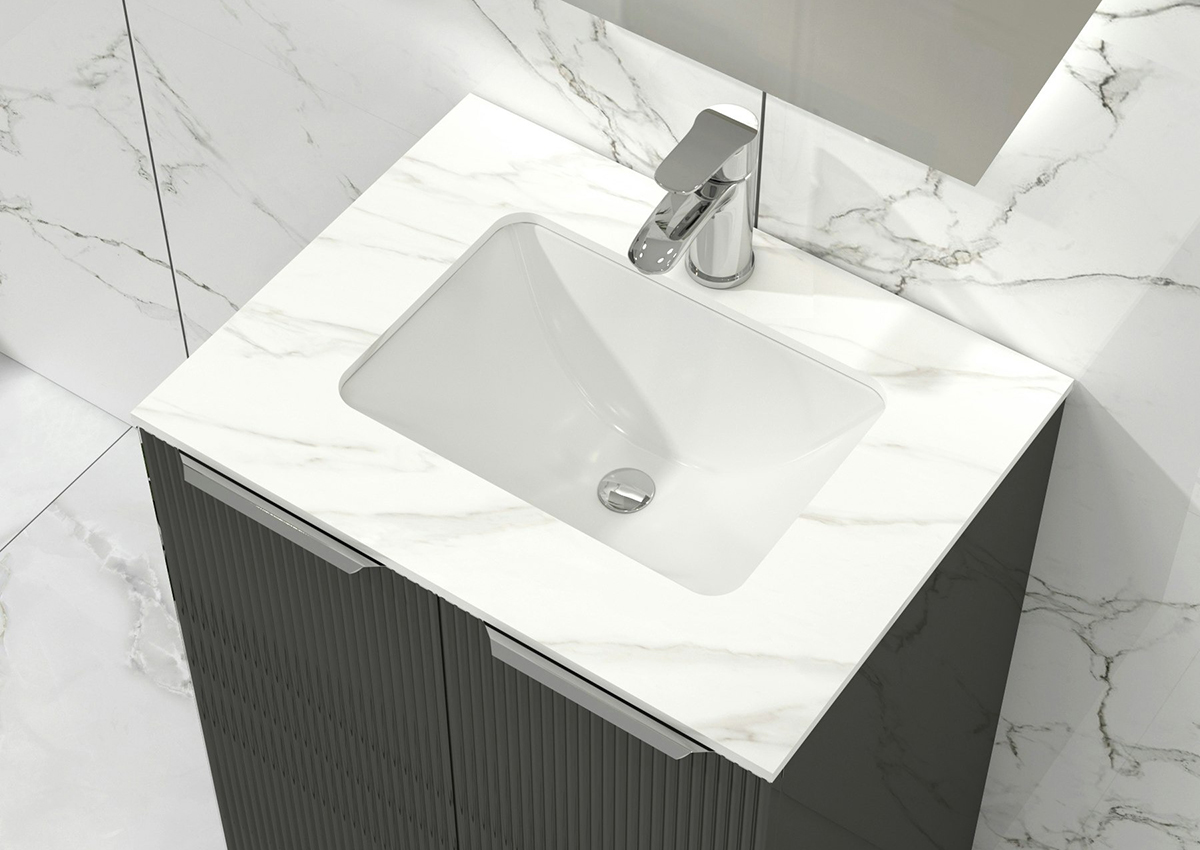
Have you just discovered sintered stone and are curious to know everything about it before upgrading your bathroom furniture?
Well, you're on the right page that answers all your concerns about this trendy bathroom furniture material. From durability concerns, to being eco-friendly and offering more room for stylish furniture, sintered stone is making headlines amongst homeowners for all the right reasons. Plus, this new material comes with unlimited benefits that can surely add more value to your hygienic lifestyle, too.
In this blog, we will discuss why you should prefer this material and what sets it apart from traditional stone.
What Is a Sintered Stone?


Sintered stone is a relatively new but popular material used for countertops, flooring, walls, and more. It is a hybrid of real stone that combines the benefits of both granite and quartz while eliminating the common drawbacks. Thanks to its natural stone appearance and, most of all, carbon-friendliness, it is one of the best materials for bathroom vanity unit countertops.
In comparison to the natural stone that forms over thousands of years, sintered stone is manufactured by compacting the various natural materials at very high temperature. It offers various advantages over other materials making it a superior choice for a variety of applications.
Sintered Stone’s Benefits
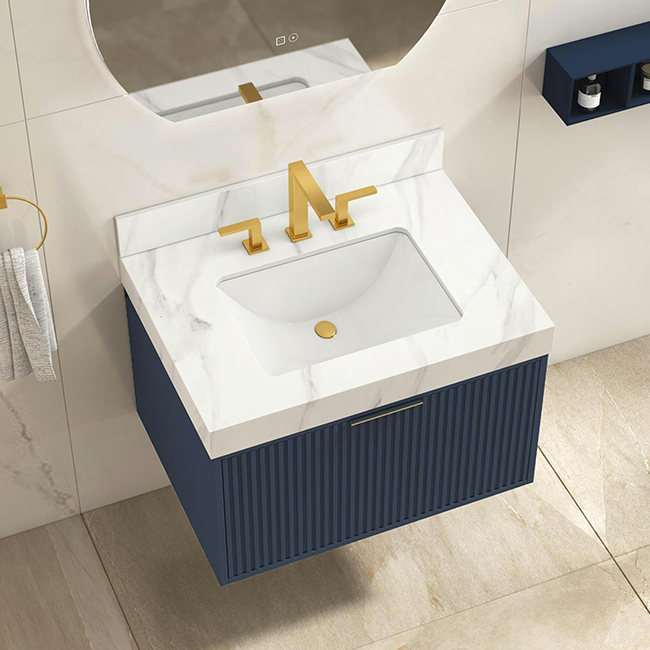

As sintered stone gains more popularity, you might be thinking of updating your existing bathroom furniture that’s specifically made with it. And if you’re having doubts why you should go with this new, and improved, material choice, here are some key advantages that this option offers to help you keep up with your hygienic and stylish lifestyle:
Durability
Sintered stone is a very popular choice for many different applications because of its extraordinary durability. The laborious sintering process exposes natural raw materials to high temperatures and pressures, enabling them to withstand the test of time. It is robust, thick, and incredibly resistant to temperature, effect, and scrapes.
Stain & Chemical Resistance
Sintered stone has a remarkable natural resistance to discoloration and toxins due to its impermeable nature. It is suitable for environments where cleaning supplies and personal hygiene items are used regularly, especially kitchens and bathrooms.
The resilience makes sure that bathroom counters won't experience leaks, splashing, or touch with various substances. Your everyday bathroom cleaning supplies won't tarnish the perfect glossy surface.
Design Versatility
Sintered stone offers an extensive range of possibilities for design. As much as your creativity allows, you can create an assortment of colours, patterns, and textures. This intrinsic variation in design allows both architects and homeowners to achieve their ideals.
When it comes to vanity countertops, this adaptability ensures that their appearance not only complements but also improves the whole design concept. Using sintered stone can enhance the bathroom's visual attractiveness, whether you're aiming for a modern concrete design or a traditional marble appearance.
Heat Resistance
One of the things that sets sintered stone apart and validates its excellence in a variety of applications is its extraordinary heat resistance. During the intricate smelting process, natural raw materials are exposed to high temperatures and pressures. It is advantageous to build a sintered stone substance with exceptional density, durability, and heat endurance that can beat UK’s extreme cold weather conditions.
Its ability to withstand heat is particularly effective for kitchen use along with an increasing demand for bathroom furniture. It is simple to insert hot styling tools into the fabric. Some deem it an excellent surface for grooming routines as well.
The countertop's immunity to heat increases its useful life and stability, making it a safer option for unforeseen circumstances. It assures you that it will always be spotless and original giving you an edge when it comes to keeping your bathroom furniture clean.
Hygienic
The impermeable layer on sintered stone actively inhibits the growth of mould and microbes. Sintered is a key component in the creation of a hygienic environment. This attribute is especially important in the restroom, where keeping things clean is quite important for brits. Your shelves (both kitchen & bathroom) will remain germ-free without applying concentrated cleaning chemicals.
Ceramic Vs. Marble Vs. Sintered Stone - What Material to Choose?
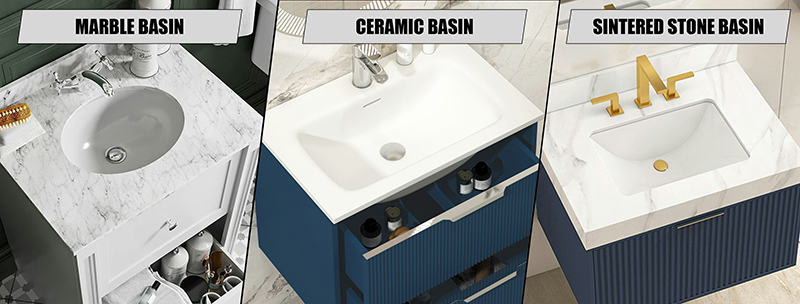

The decision-making gets difficult when you have multiple options to choose from and each one has astonishing qualities, too. The same goes with the material selection amongst Ceramics, Marble or Sintered Stone because all three offer you amazing qualities. So, here's a quick comparison between each material type to help you pick the best one especially when you want to upgrade your bathroom furniture with something more durable and less maintenance difficulty.
Composition
- Ceramic: Made from clay, minerals, and water, the ceramic is given a required shape. It is then kiln-fired at low temperatures in comparison to sintered stone.
- Marble: A natural stone formed from limestone that has undergone metamorphism. It consists primarily of calcite or dolomite minerals.
- Sintered Stone: The sintered stone is made entirely from natural stone. Quartz is usually the base component combined with feldspar, clay, pigments, and resin. All of this material goesthrough a process called sintering, where the raw materials are heated and compacted to create a solid, dense material.
Strength
- Ceramic: Ceramic is a reasonably durable material but not as resistant to scratches and heat as sintered. Additionally, it can be prone to chipping and cracking.
- Marble: In comparison to ceramic, marble is a relatively softer material. It is a porous material that is more susceptible to scratches, etching, and staining.
- Sintered Stone: When it comes to durability, sintered stone takes the lead. It is generally more durable in comparison to ceramic and marble. Not only can it withstand high temperatures, but it is also resistant to scratches and stains. Additionally, the low porosity makes it less prone to absorption.
Appearance
- Ceramic: Ceramic is available in various forms, glazes, patterns, and finishes. It mostly appears to be white or translucent. However, the design may be as consistent as sintered stone.
- Marble: A popular material known for its natural beauty and availability in various colours. Each of its slabs is one of a kind, showcasing unique veining and patterns.
- Sintered Stone: Because it is engineered stone made with natural materials, manufacturers are able to offer it in a wide range of colours and patterns. Its appearance and feel are similar to the natural stone, with a consistent design throughout the slab.
Maintenance
- Ceramic: A commonly used material that can be both porous or non-porous but usually requires low maintenance. Grout lines are easy to clean but will require more attention and sometimes periodic sealing may be required.
- Marble: The naturally porous material will require much more maintenance than sintered stone and ceramics. It will also require regular sealing to protect against the stains.
- Sintered Stone: Sintered stone is a non-porous material that does not absorb water or any other liquid, making it perfect for bathroom sink countertops. Additionally, it does not accumulate spots when anything comes in contact with it. That means it is easy to clean, requires low maintenance, and is resistant to stains. Moreover, it will not require sealing like other materials.
Cost
- Ceramic: Typically more affordable than sintered stone and marble. That's what makes it the most popular material for bathroom vanity unit countertops.
- Marble: Varies widely in cost, with some varieties being more expensive than sintered stone and ceramic. You may also get these relatively less expensive depending on availability, quality, and appearance.
- Sintered Stone: Generally more expensive than ceramic but can be comparable or slightly less expensive than high-end marble.
Application
- Ceramic: Commonly used for flooring, backsplashes, and wall coverings. It may not be as suitable for heavy-duty countertop use.
- Marble: Widely used for countertops, flooring, and decorative applications. It may be less suitable for high-traffic areas.
- Sintered Stone: It is suitable for a wide range of applications, including countertops, flooring, wall cladding, and outdoor use.
Our Top Sintered Stone Countertop Picks
Since you’re aware of how sintered stone can add more value to your lifestyle in comparison to other materials, you might be wondering where to shop for products made with it. In case you’re looking for bathroom furniture like vanity units, countertops and more regularly used items, this material is a perfect choice for your investment.
Here, we have top picks from our sintered stone countertop vanity units. You can explore a variety of colours and finishes to find the ideal match for your space.
Vienna Navy Blue Vanity Unit with Brushed Brass Frame & Carrara Marble Top
Vienna Navy blue floor standing vanity unit has a modern design that is perfect for a contemporary bathroom. This stylish piece has a brushed brass frame and carrara marble top that will bring luxurious vibes to the space.
Florina Mint Green Vanity Unit with Pandora Marble Top & Brushed Brass Handle
Florina wall-hung vanity unit is a stylish and space saving piece. It features a pandora marble top for timeless aesthetics. The attractive mint green colour creates a calming ambiance in the bathroom.
Infinity Gloss White 2 Drawer Wall Hung Vanity Unit with Black Star Marble Top
Infinity Gloss Wall Hung Vanity Unit is a sleek and modern piece that not only saves space but also adds a touch of sophistication to your decor. It features a modern handleless design with a groove for opening and closing drawers.
Lyon Fluted Gloss Anthracite 2 Drawer Floor Standing Vanity Unit with Carrara Marble Top
Lyon floor standing vanity unit features a unique fluted design and carrara marble, adding a touch of luxury and style. It comes in a glossy dark finish that is perfect for a modern bathroom.
Final Thoughts
Sintered stone stands out as an eco-friendly and durable choice for vanity countertops, offering a sustainable alternative to traditional materials such as ceramic, marble, and granite. With its impressive durability and stain-resistant properties, it not only enhances the longevity of your countertop but also contributes to a more environmentally conscious choice.
If you're in search of something trendy and unique, sintered stone may be the perfect option for you. Our collection features an extensive range of sintered stone countertop vanities with various designs to suit your preferences. Explore our Vienna, Florina, Lyon, and Infinity bathroom furniture ranges to discover the perfect fit for your style and needs.

